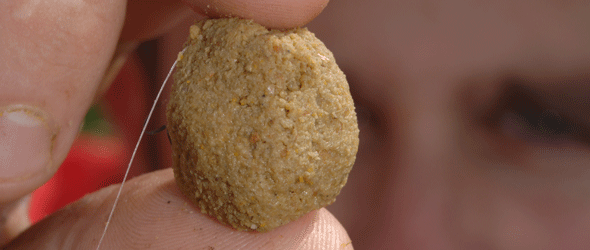Making paste to catch chub, carp and barbel
Paste is a fantastic bait that is often neglected by anglers, often due to the fact that it can be quite difficult to hook, and keep on the hook. But, get it right and you can enjoy some absolutely enormous hauls of match-sized carp, and smash your personal best chub, barbel or carp.
Paste is basically a soft and pliable mixture of powdered and solid ingredients that can be moulded around the hook. Because the bait is moulded around the hook, the hook is invisible to the fish, making it quite easy to trick the fish into taking the bait.
The most difficult part of paste fishing is introducing the baited hook into your swim without the soft paste falling off the hook, but with a little ingenuity this can be overcome quite easily.
There are two main types of paste – those used by match anglers to catch many fish really quickly, and those used by specimen anglers to trick big fish into taking the bait.
Making a paste for commercial carp
Match anglers tend to use paste in conjunction with a pole, as poles allow the paste to be lowered gently into the swim, rather than cast it out. This means that the paste will remain on the hook better.
Paste for match fishing is really very simple indeed. Any finely ground fishmeal groundbait can be made into a paste in seconds, providing a simple, soft and highly effective carp bait.
Simply take a clean bait box, scoop up about half a cupful of water and add a little fishmeal groundbait. Mix it up thoroughly, and keep adding groundbait and mixing until you have a soft and sticky ball of paste. And that’s all there is to creating a great paste ideal for use on a pole rig on commercial carp waters.
Making a paste for river chub
This paste is a little trickier to make, a little more expensive, but it stinks to high heaven, sticks to the hook perfectly and helps catch some great chub.
Take a chunk of Danish Blue cheese and crumble it into a round mixing bowl. Sprinkle a little flour over the pieces and continue to break it up using our fingertips. Keep adding flour until the cheese resembles fine breadcrumbs.
Now is the time to add any colouring and additional flavour to the mix. A couple of drops of Supercook cake and icing colouring is perfect here, and it’s fairly cheap too.
Tip a couple of teaspoons of water over the mix and begin turning it over with a fork. The cheese, flavour, colour and flour will begin to bind. Keep mixing with the fork and adding very small quantities of water until the mix begins to ball-up. Now you will be able to get hold of the mix and knead it into a ball. This will distribute the colour evenly and soften the paste.
Once it’s thoroughly mixed through, divide the paste into suitable sized lumps to see you through a session, bag it securely and pop in the freezer until you need it.
This paste will last for years, and it can even be re-frozen a few times, and still catch chub!
Making a paste for big carp
By far the best paste to use when fishing with homemade boilies is simply a little of the leftover boilie mix which has been wrapped around the boilies itself. This will stick to the boilies perfectly, release a scent trail for a long time, and take ages to break down. But, not all carp anglers make their own boilies, so here’s what you can do…
Crack a couple of eggs into a round mixing bowl, add any colouring or flavourings you wish and then mix thoroughly using a fork. Now sprinkle a little finely ground carp groundbait into the eggs and continue mixing.
Keep adding the groundbait and mixing until the mix stiffens enough for it to be kneaded by hand. Knead it thoroughly to ensure all the crumbs absorb the moisture from the eggs and there you have it – a great specimen carp paste that can be moulded around a boilie, a pellet, meat, even a cork ball.
The eggs used in the mix will help bind this paste, ensuring that is takes a long time to break down once it hits the bottom.
Hooking paste
This is really very simple to do, regardless of whether you intend presenting the paste around the hook directly, or around a secondary bait such as a boilies or pellet.
Simply tear off a chunk of paste that will be large enough to wrap around your hook or bait. Flatten it slightly, but not too much. Now place your hook or bait onto the middle of the paste and gently fold the paste around.
Use your fingertips to carefully squash the paste until it forms either a teardrop shape, if you are moulding it around your hook, or a ball, if you are moulding it around another bait. And that’s all there is to it!





